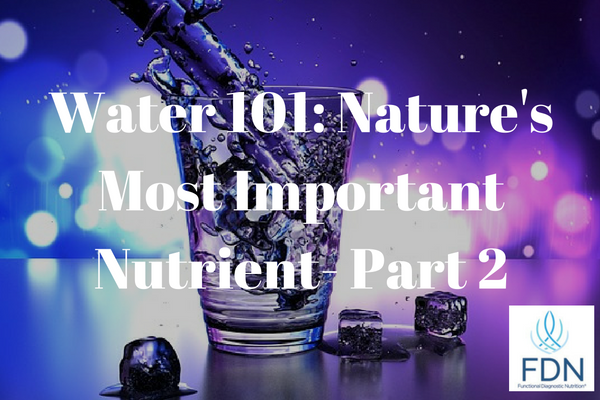Here is part two of our Water 101 series. Read part one here.
Where does it all go?
If you make the average 6-8 trips to the restroom per day, that is 8 cups of water leaving the body. Your lungs expel between two and four cups of each day through normal breathing. That number is even higher on a cold day. Sweaty feet, palms, and underarms (not exercise induced) account for a couple more cups. It’s easy to drop below optimum hydration if you aren’t mindful of your water consumption.
These days, there are so many yummy beverage choices good old water can easily be forgotten. The problem is that many people are opting for beverages that are mildly dehydrating, high in calories, and containing toxins. Alcohol can be especially dehydrating. If you do choose to indulge in an alcoholic beverage, be sure to follow it with a glass or two of water. Many people also have a hard time distinguishing hunger from thirst. There is a tendency to think that when we begin to feel fatigued, lightheaded or weak, that we need food. More often than not, the body is simply lacking water. Those who reach for water first tend to have an easier time managing their weight.
How Much Do You Need?
Most people have heard “8 glasses a day” from one source or another. Most health professionals, nutritionists, and personal trainers for years have encouraged clients to drink eight 8-ounce glasses of water a day. Eight 8-ounce glasses is equal to 2 quarts, one-half a gallon, or approximately 1.9 liters. Surprisingly, no scientific evidence can be found that supports this “8 X 8”recommendation.This advice can be traced back to a 1945 publication by the Food and Nutrition Board of the National Research Council. The publication stated: “A suitable allowance of water for adults is 2.5 liters (approximately 10 glasses) in most instances.”
Different factors
Just like dietary needs, everyone’s requirement is different. It varies by age, body composition, size, physical activity, health, climate, and other biological and environmental factors. In general, men need a bit more water than women. They generally have more muscle mass, which requires more water than fat. Nursing women and those with certain health conditions like diabetes also have a higher water requirement.
The Institute of Medicine recommends that men consume 3 liters (about 13 cups) of total beverages a day and women consume 2.2 liters (about 9 cups) of total beverages a day. These guidelines are based on national food surveys that assessed people’s average fluid intakes compared with mental and physical performance. For a more specific measure, Paul Chek of the CHEK Institute recommends determining your daily water requirement by multiplying 0.033 liters by your weight in kilograms. However, since everyone’s requirements will be slightly different, a good way to gauge if you are getting enough water is the color of your urine. If your pee isn’t mostly clear and you are experiencing any of the symptoms mentioned above, chances are you need to increase your intake of H2O.
A Lot to Swallow
Nine to thirteen cups a day might seem like a lot of water to gulp down. Despite all we know about its health benefits, there are some people (maybe even you) who just don’t like the taste of water, and for one reason or another, simply cannot seem to drink the daily dose. The good news is, in terms of hydration, almost any liquid you consume (with the exception of alcohol and certain herbal teas) can count towards your daily tally.
This includes juices, smoothies, some teas, even sodas, coffee, and sport drinks. Just be careful of extra calories, caffeine, colors and additives in your favorite liquids, as they can lead to other unwelcome health issues. This is why clean clear water is still the best choice. Keep in mind that, just like we are composed largely of water, so are many of the foods that we can eat. Twenty percent or more of your daily intake of water can come from foods such as fruits and vegetables, juices, soups, and even ice cream. Fruits and vegetables are packed with nutrition and flavor, yet are low in calories and fat – making them the healthiest choice. Try munching on low glycemic index fruits and veggies for a hydrating snack.
Water everywhere, but not a drop to drink
These days we have many different options, but they are not all healthy! Tap water is just municipal water that comes out of the faucets and has been treated, processed and disinfected. It is purified with chlorine and often has added fluoride. Some studies have shown fluoride to have negative neurological effects, and some of the byproducts from using chlorine in our drinking water are linked to cancer. Additionally, depending on where you live, tap water can also contain significant levels of pharmaceutical drugs and antibiotics.
Needless to say, unfiltered tap water is not the best choice. Bottled Water, often times, is not much better than what comes from the tap. In many cases, bottled water is just purified municipal water and lacks essential minerals. (Brands like Dasani and Aquafina are this type.) Distilled and purified bottled waters are devoid of essential minerals that are necessary for good health. Minerals are so important to good health. Mineral deficiency can lead to insulin resistance, migraines, high blood pressure, constipation and even heart beat irregularities!
Best Choices
The best water to drink is naturally clean, pure and full of naturally occurring minerals:
- Well or natural spring water, both of which come from clean natural sources and contain nutrients and minerals. If you are feeling adventurous, you can find a natural spring near you, and go “forage” for your own water. Visit www.findaspring.com.
- Bottled artesian or natural spring mineral waters come from a natural source but are bottled off-site. Look for products in glass bottles (which eliminates dangerous BPAs and toxins that can leach into water in plastic bottles) and ones that have been purified through micron filtration or ozonation.
- Mineral water could be natural spring water or artesian water, comes from an underground source, and contains at least 250 parts per million (ppm) of dissolved solids, including minerals and trace elements.
All of the types of water mentioned above have essential minerals and nutrients like magnesium, potassium, and sodium. These minerals play a major role in your overall health. They help to balance your hormones, improve sleep and brain function, keeps your bones strong and even help to prevent muscle cramps. If you suspect that you have hormone imbalances or suffer from other health issues you may want to have your body’s mineral levels check.
Filters
Remember that any filter is better than no filter. So even standard faucet-mounted filters or pour through types that you can purchase at the store, help remove chlorine and improve the taste, but they also remove minerals. Carbon filters that mount under the sink are also a low cost option. There are also several, more expensive, whole house options that you can choose from. Just do your homework, and if possible, opt for ones that leave some minerals in your water.
Raise Your Glass – Your Hydration Action Plan
It is refreshing to know that the simple act of drinking water can produce so many positive benefits to your health and well-being. Water is inexpensive, readily available, and easy to drink. Here’s a simple strategy to keep you hydrated: Begin by drinking a glass of water as soon as you wake up, and 30 minutes before eating any big meal. (This will help control appetite, too.)
Get in the habit of keeping a water bottle on hand at all times. Sip some at your desk, and take a few swigs after every trip to the restroom. If the taste of plain water begins to bore you, spice up the taste with a squeeze of citrus or a slice of fruit. Sliced vegetables and herbs can also be infused into a jug of water for a refreshing treat. You can also cut your favorite juice drinks in half with water for a lighter flavor, or opt for carbonated water if you like the fizz. Gulp for gulp, drinking water is one of the best things you can do for your health.








